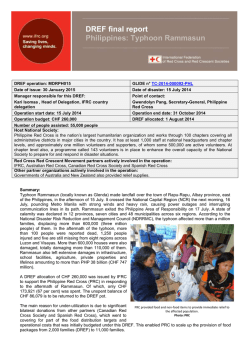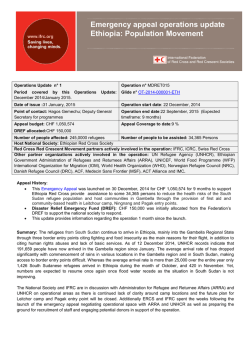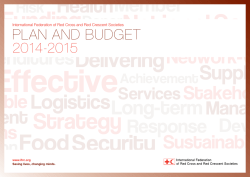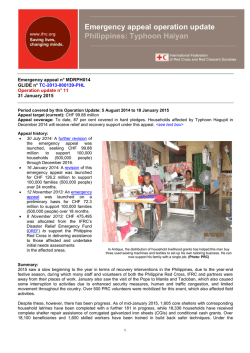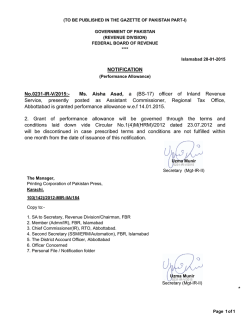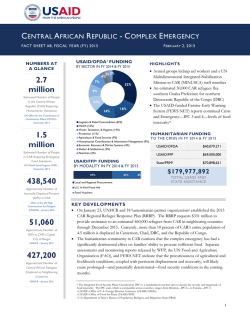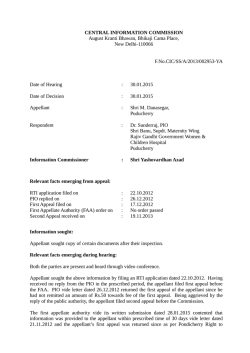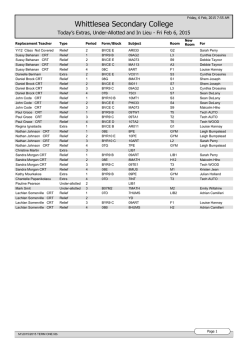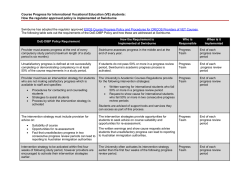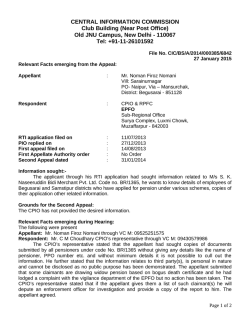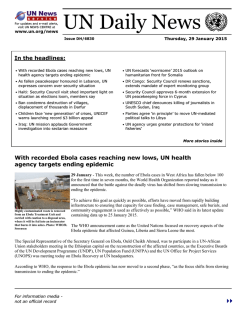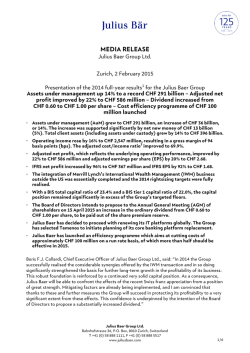
Emergency appeal Pakistan: Monsoon Floods
Emergency appeal Pakistan: Monsoon Floods Emergency Appeal n° MDRPK010 Glide n° FL-2014-000122-PAK Issued: 29 January 2015 70,000 people to be assisted Appeal timeframe: 7 months End date: 11 April 2015 DREF allocated: CHF 299,798 Appeal budget: CHF1,097,926 This Emergency Appeal seeks CHF 1,097,926 to enable the International Federation of Red Cross and Red Crescent Societies (IFRC) to support the Pakistan Red Crescent Society (PRCS) to deliver immediate assistance and support to 10,000 flood-affected families (70,000 people), focusing on food and relief item distributions, health and hygiene promotion, emergency shelter assistance. The planned response covers only the relief phase. The national society will not be undertaking recovery initiatives as other organizations are contributing to these efforts. Details are available in the Emergency Plan of Action (EPoA) revision <click here> The disaster and the response st 1 week of September 2014: Heavy rains and flash flooding in the four eastern rivers of Pakistan affected Azad Jammu & Kashmir (AJK), Gilgit Baltistan (GB) and Punjab regions. PRCS dispatches teams to conduct preliminary assessments in affected areas. 8 September: A regional information bulletin on the IFRC response to monsoon floods in the South Asia region was issued. 12 September: DREF for CHF 299,789 launched to support 24,500 people for 3 months with emergency health services, food, emergency shelter and essential household item assistance. 23September: Emergency Appeal for CHF 2.8 million launched to support 227,500 people for 6 months with provision of emergency health services, food, water and sanitation services, emergency shelter and essential household assistance. Source from NDMA as of 9 October 2014 4,065 villages affected 367 people confirmed dead 673 people injured 2.47 million people affected 107,102 houses damaged 29 January 2015: The Emergency Appeal budget is revised down to CHF 1,097,926 to support 70,000 people for 7 months. The operation will continue to focus on bringing relief to the flood-affected families, as other organizations are undertaking recovery initiatives. PRCS will support 10,000 flood affected families with food assistance. Photo: IFRC. Page |2 Coordination and partnerships Government authorities at Federal, Provincial and State levels led the response, with local non-government organisations providing support to meet the immediate needs of the flood-affected population through targeted distributions of cash and relief items. The PRCS has worked in close collaboration with State, Provincial and District authorities who coordinate the overall response. The PRCS has convened briefing sessions for Movement partners on the current flood situation, the immediate response actions, and planned activities with participation from representatives of PRCS, IFRC, Partner National Societies, and ICRC. The IFRC has maintained regular communication with Partner National Societies to complement previous updates and coordination messages sent electronically and have assumed a coordination role in support of the PRCS. The IFRC Pakistan Delegation is in coordination with other humanitarian actors in the country through fora such as the Humanitarian Country Team (HCT), the Pakistan Humanitarian Forum (PHF) and UN-OCHA. This coordination includes the sharing of regular updates on the PRCS response to the floods. The WFP has also collaborated with the PRCS by topping up the society’s food packs with high energy biscuits, during recent relief distributions undertaken by PRCS in five districts in Punjab province. While the Government did not request international assistance for the relief phase, assistance was sought in undertaking a Multi-Sector Initial Assessment (MIRA) in the five worst affected districts of Punjab (Jhang, Mandi 1 Bahauddin, Multan, Chiniot and Hafizabad) . The report has been published and based on the findings, the Federal Government is asking for support for recovery initiatives. 2 A recently published Recovery Needs Assessment and Action Framework 2014 – 2016 highlights the livelihoods losses in the agriculture and non-farm sectors. With an estimated 2.412m acres of crops affected and 9,722 heads of cattle perished, the continuing need for distribution of food is clear, at least until recovery of farm-based livelihoods and replenishment of livestock can be undertaken in the flood-affected areas. The operational strategy In coordination with the NDMA and respective disaster management authorities in AJK State and the affected Provinces, the PRCS mobilized response teams, conducted rapid assessments and launched an operation to meet the immediate needs of flood-affected populations. The initial plan of action has been revised as the situation evolved and the situation on the ground became clearer. The operation is hinged on PRCS involvement in the following areas of response: Distribution of food: PRCS will support 10,000 families with food assistance and will coordinate with district authorities to identify the underserved areas. Emergency shelter and essential household items: PRCS has supported 3,392 families with 3 emergency shelter and essential household items after which there was no need for further distributions. The Appeal will replenish critical deficient items in PRCS stock that were distributed during the Emergency, along with topping up of existing pre-positioned items, such as mosquito nets. Emergency health services: Based on the needs identified, mobile health units were deployed to affected districts of AJK and Punjab from 15 September to 31 October, after which there was no need for further deployment. These sectors are defined in the PRCS Contingency Plan for the Monsoon 2014. 1 The MIRA was carried out jointly with local authorities between 16 and 20 September. The draft report was shared with humanitarian actors on 29 September. The report cited losses to the agricultual sector and highlighted the public health risks to flood-affected and nonaffected communities posed by stagnant water. The assessment also found that many communities were already moving into recovery activities. The report is available at: http://www.ndma.gov.pk/new/Documents/mira_2014.pdf 2 The Recovery Needs Assessment and Action Framework 2014 – 2016 is available at: http://www.ndma.gov.pk/new/Documents/Recovery_Needs_Assessment.pdf 3 Essential household items include tents/tarpaulin sheets, hygiene kits, kitchen sets, blankets, mosquito nets and jerry cans. Page |3 Risks Relief efforts and assessments in affected areas were initially constrained by a lack of access as stagnant water has blocked roads. Mobilization and motivation of trained staff and of volunteers is a pre-requisite to the success of this intervention. PRCS Senior Management has ensured that the mobilization of volunteers and staff was done in a timely manner and to meet the required needs. As a major portion of the budget is allocated to the procurement of relief items, standard procurement procedures will be followed in order to complete the operations in the stipulated timeframe. Selection of beneficiaries At the district level, PRCS branches participate in district coordination meetings (DCM), which are hosted by respective district coordination officers. The DCM, having an overview of the situation, assigns the geographical areas to be covered by different humanitarian organizations, including PRCS. The National Society’s technical departments then are engaged in the initial damage and needs assessment and planning for the relief and response operation. The following broad considerations will be taken into account in the selection of beneficiaries in the target areas: Unaccompanied elders and elderly couples Sick or people with disabilities and/or family members with disability Pregnant or lactating mothers Unaccompanied orphans and destitute children Families who have family members who have died Families who have lost the main income earner Families headed by divorcees or widowed persons without a source of income Families that have lost all properties – houses and crops damaged Scheduling of planned sector interventions Sep Oct 2014 Nov Dec 2015 Jan Feb Mar Apr ASSESSMENT HEALTH SHELTER FOOD IFRC Country Office, supported remotely by the Asia Pacific (AP) Zone Disaster Management Unit, has been giving continuous support to the PRCS in operational planning and coordination, keeping partners and the global system informed about the situation and accessing IFRC funding mechanisms on behalf of PRCS. In addition, the AP Zone technical support team (i.e. Health, Shelter, Logistics, PMER, etc) has also provided technical review on the revised operation plan. At the end of the operation, an internal review will be conducted to capture the lessons learnt and for use in future reference – with the view of promoting better programming. In addition, a final evaluation of the operation will be conducted. A final report will be available 90 days after the end of operation. Budget See the attached IFRC Secretariat budget for details. Walter Cotte Under Secretary General Programme Services Division Elhadj Amadou As. Sy. Secretary General Page |4 Contact information For further information specifically related to this operation please contact: Pakistan Red Crescent Society: o Mahboob Sardar, Secretary General, phone: +92 51 925 0407; email: [email protected] o Ghulam Muhammad Awan, Director of Operations, phone +92 51 444 8311; email: [email protected] IFRC Pakistan Delegation: o Gorkhmaz Huseynov , Head of Delegation; office phone: +92 51 9250416/17; mobile: +92 308 8888054; email: [email protected] o Shesh Kafle, Disaster Management Coordinator; mobile: +92 300 555 4515; email: [email protected] IFRC Regional Delegation: o Simon Missiri, Head of Regional Office, phone: +91 11 26154021 to 24; fax: +91 11 26154025; email: [email protected] IFRC Asia Pacific Zone Office: o Andreas Weissenberg, Operations Coordinator; office phone: +603 907 5729; email: [email protected]. In Geneva: o Christine South, Operations Support; office: +41 22 730 4529; email: [email protected] IFRC AP Zone Logistics Unit (ZLU): o Florent Chane, Zone Logistics Coordinator; mobile: +60 12 298 9752; email : [email protected] For Resource Mobilization and Pledges: In Asia Pacific Zone Office: o Emilia Koski, Relationship Manager; mobile:+60 12 230 7548; email: [email protected] For Performance and Accountability (planning, monitoring, evaluation and reporting enquiries): In Asia Pacific Zone Office: o Peter Ophoff, Head of PMER; office: +603 9207 5507; email: [email protected] How we work All IFRC assistance seeks to adhere to the Code of Conduct for the International Red Cross and Red Crescent Movement and Non-Governmental Organizations (NGOs) in Disaster Relief and the Humanitarian Charter and Minimum Standards in Humanitarian Response (Sphere) in delivering assistance to the most vulnerable. The IFRC’s vision is to inspire, encourage, facilitate and promote at all times all forms of humanitarian activities by National Societies, with a view to preventing and alleviating human suffering, and thereby contributing to the maintenance and promotion of human dignity and peace in the world. REVISED EMERGENCY APPEAL 20/01/2015 MDRPK010 Pakistan : Monsoon Floods Budget Group Appeal Budget CHF Shelter - Relief Food Medical & First Aid Total RELIEF ITEMS, CONSTRUCTION AND SUPPLIES 218,668 550,000 53,000 821,668 Storage, Warehousing Dsitribution & Monitoring Transport & Vehicle Costs Logistics Services Total LOGISTICS, TRANSPORT AND STORAGE 23,000 52,960 51,825 10,000 137,785 National Staff National Society Staff Volunteers Total PERSONNEL 4,610 34,400 15,000 54,010 Professional Fees Total CONSULTANTS & PROFESSIONAL FEES 7,500 7,500 Office Costs Communications Shared Support Services Total GENERAL EXPENDITURES 1,000 5,000 3,954 9,954 Programme and Supplementary Services Recovery Total INDIRECT COSTS 67,010 67,010 TOTAL BUDGET 1,097,926 Available Resources Multilateral Contributions TOTAL AVAILABLE RESOURCES 1,098,146 1,098,146 NET EMERGENCY APPEAL NEEDS 0
© Copyright 2026
